This “lesser-known cousin of moules marinière”, as Nigella describes mouclade, is a speciality of the Poitou-Charentes region in western France, where it started life as a “humble dish for fishermen”, according to Michel Roux. But you don’t have to have been hauling nets all day to appreciate its creamy sauce or delicate spicing, a legacy, it is said, of La Rochelle’s historic role in maritime trade from the east. A favourite of Michel’s brother, the late Albert Roux, who would often, his son says, order a double helping of the starter-sized portion served at Le Gavroche, mouclade is as much of a winter warmer as any hearty seafood stew, but on the table in half the time.
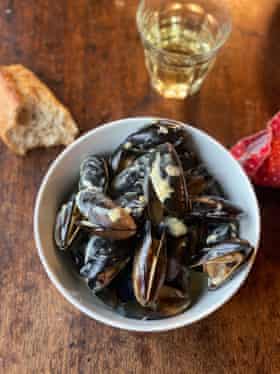
The mussels
Standard procedure here: wash and debeard, as the act of stripping the creature of the threads that once attached it to the surface it grew on, is happily known, before cooking. (Frozen mussels tend to be sold ready-cleaned.)
Most mouclade recipes steam the mussels in a dry pan before making a sauce from their juices, but a few, including Michel Roux Jr’s version from his book A Life in the Kitchen and that of Madame Brigitte Ravail (native of Châtelaillon in the Charente-Maritime, featured in the excellent 1981 collection, Les Recettes de Mon Village) steam them with wine and aromatics instead. This, of course, is usual when making something like moules marinière, but mouclade is a two-step process, and picking out bits of semi-raw onion from among the shells is a tedious business.
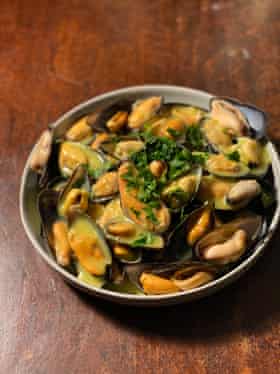
You could get round this by sauteeing the onion first, as Roux Jr recommends, but as his sauce starts with sweated shallots, I don’t see much point in adding onions to the mussels as well. Cooking them in wine, crushed garlic and herb stalks will, however, make them taste even better – the garlic will disappear into the whole, while the stalks can be easily fished out. (If you happen to have dry vermouth or similar, rather than white wine, Lawson recommends you dilute it with the same amount of water – or, if you’d prefer to leave the wine out altogether, Alan Davidson gives a recipe sharpened with lemon juice at the end instead.)
Traditionally, it seems, mussels are served on the half shell for mouclade, which tends to be less liquid than marinière, and indeed, the picture in Les Recettes de Mon Village shows a handsome platter one could put in the middle of the table at party, if such things weren’t a distant dream right now. For individual consumption, I’d leave them whole, because they’ll stay warmer, but do as you prefer – I notice after eating his recipe from the shell that Roux picks them all out before serving, which is a good idea if you’re going to have them as a main course with rice, as his late uncle Michel Roux recommends in The Essence of French Cooking.
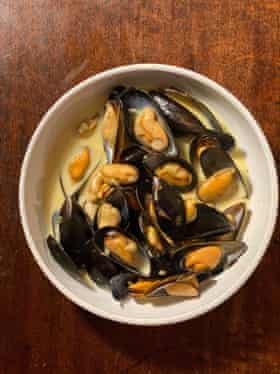
Nigella Lawson’s avowedly quick one-pot take, from Nigella Express, simplifies the process to one very similar to a marinière, and is to be recommended if you’re in a tearing hurry for mussels, but truth be told, it’s not a great faff either way.
The aromatics
Some sort of allium makes a nice base for the sauce: you could use onion, but I like the sweetness of Roux’s shallots, or Lawson’s baby leeks, with the saltiness of the seafood. (Larousse Gastronomique and Davidson’s classic North Atlantic Seafood both use garlic, but that’s already in the cooking liquor, so it doesn’t seem necessary to include it twice.)
Herb wise, I’m going to keep things simple, because I’d like spice to be the principal flavour. I’m leaving out Ravail’s bay leaf, Roux’s thyme, Julia Child’s fennel and Hugh Fearnley-Whittingstall and Nick Fisher’s lovage leaves from The River Cottage Fish Book in favour of the stalks of the parsley whose leaves will eventually garnish the dish.
The spice
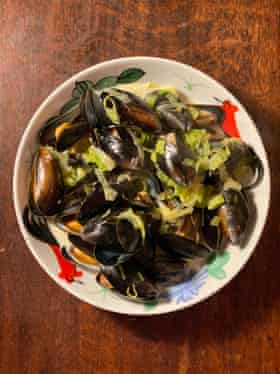
Spice is the defining characteristic of mouclade. Davidson, who came across the dish at Restaurant de la Marée at La Rochelle, reports that, despite the busy-ness of the service, “I was able to ask whether their mouclade contained saffron. The answer was that when real saffron was available at a reasonable price, a touch of it would be added at the last moment, but that curcuma (turmeric) made a satisfactory substitute.” Larousse suggests curry powder or saffron, and Ravail, Roux and Lawson curry powder, with Roux calling for mild and Lawson medium. Turmeric gives glorious colour, but not much in the way of flavour, while subtle saffron struggles against the seafood and garlic, so I think curry powder, a blend that now pops up more in French than in British cooking, is by far the best bet, being fuller flavoured, yet gently warming rather than overtly hot.
The dairy
Instead of being served in the thin broth familiar from the marinière preparation, the mussels in mouclade are, as Larousse explains, “coated” with a sauce made from “their cooking liquid enriched with cream and butter”. Larousse and Davidson’s sauces both start with a butter-heavy roux, while the rest use dairy as a thickening agent – creme fraiche for Ravail, double cream for Roux and Lawson – with Davidson finishing his by beating in an egg yolk.
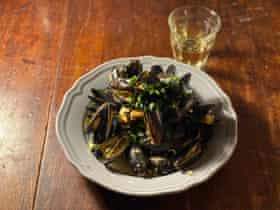
All are, of course, delicious, but the simplicity of Roux’s version – the reduced cooking liquid mixed with cream – appeals most, with its velvety texture and rich flavour. Serve with a scattering of peppery parsley, and some bread or rice to mop it all up.
Perfect mouclade
Prep 15 min
Cook 20 min
Serves 2 as a light meal, or 1 greedy person
1kg mussels
2 garlic cloves, peeled and crushed
1 small bunch parsley, leaves picked and stalks reserved
150ml dry white wine
1 tbsp butter
2 shallots, peeled and finely chopped
2 tsp curry powder
100ml double cream or creme fraiche
Salt and black pepper
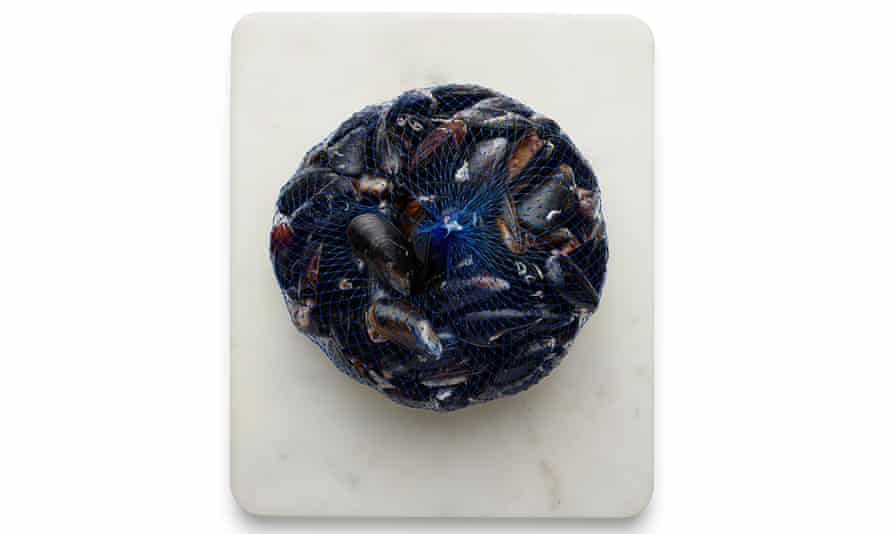
Rinse and clean the mussels in cold water, tugging off any beards and discarding any with badly broken shells. (Don’t worry about open or closed ones at this point.)
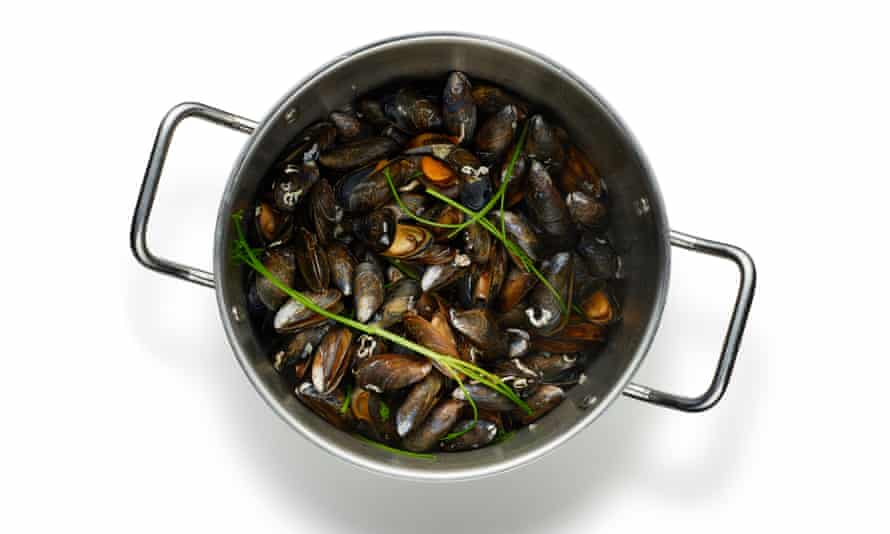
Put in a large pan with the garlic, parsley stalks (they’re easier to pick out if you leave them in one piece) and wine, cover and cook over a medium-low heat, shaking the pan occasionally to move the mussels around, until the shells open.
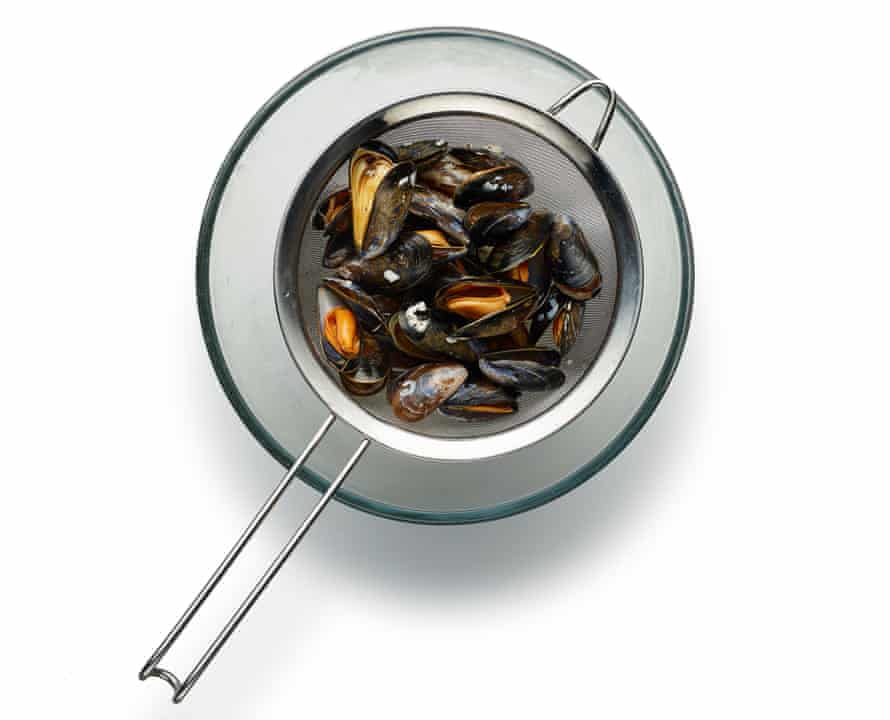
Drain the mussels through a fine sieve set over a heatproof bowl to catch the cooking liquor. If you’d like to serve the mussels on the half shell, or shelled full stop, do this now, working quickly so they stay warm. Discard any shells that have remained tightly closed.
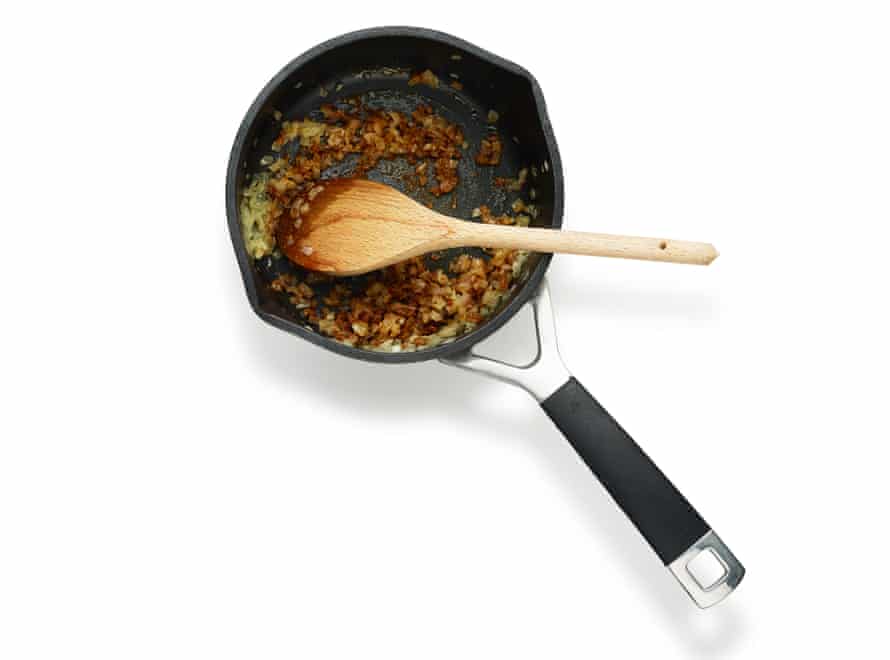
Melt the butter in a medium pan and fry the shallots until soft. Stir in the curry powder, cook for a minute or so, then add the mussel cooking liquid and bring to a simmer. Bubble until reduced by about half. Meanwhile, finely chop the parsley leaves.
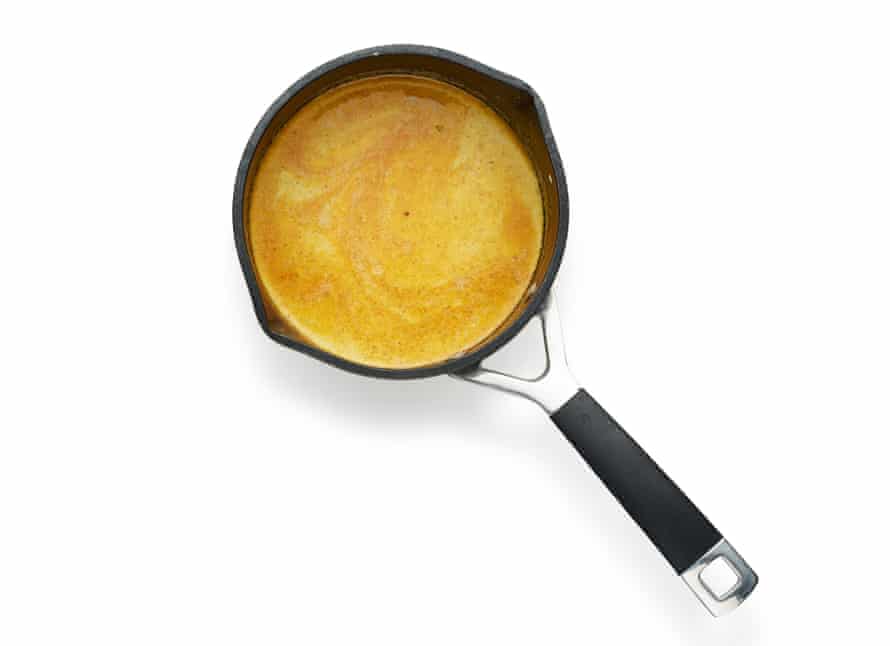
Take the pan off the heat and stir in the cream.
Season to taste, then divide the mussels between bowls and pour over the sauce (or stir the shelled mussels into the sauce before serving). Scatter with chopped parsley and eat immediately.
• Marinière, mouclade, stuffed mussels, mussel curry: what’s your preferred way with these versatile little bivalves, and where does your favourite come from?
